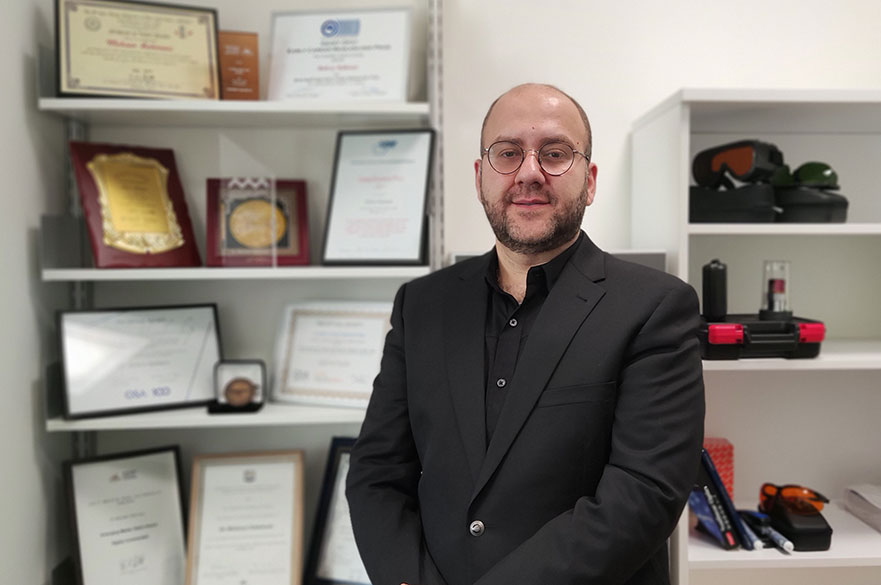NTU awarded prestigious Royal Society Wolfson Fellowship
Dr Mohsen Rahmani, part of the Department of Engineering in NTU’s School of Science and Technology, has been awarded a £250,000 Wolfson Fellowship
By Becky Timmins | Published on 12 November 2020
Categories: Research; School of Science and Technology;

A Royal Society Wolfson Fellowship has been awarded to Dr Mohsen Rahmani, an academic in the Department of Engineering at NTU’s School of Science and Technology. This Fellowship enables UK universities and research institutions to strategically recruit and attract outstanding researchers and their teams to the UK from overseas by offering long-term support and flexible funding to conduct high-quality research.
NTU has been awarded a £250,000 Wolfson Fellowship to attract Dr Mohsen Rahmani and his team from the Australian National University, located in the Australian Capital Territory. Dr Rahmani has been recognised for his research excellence in nanotechnology and nanophotonics, having received multiple prizes, including the Eureka prize (Australian Oscar of Science), and those from prestigious societies such as the Optical Society of America and the International Union of Pure and Applied Physics.
Dr Rahmani will develop the Advanced Optics and Photonics Laboratory to model, fabricate and characterise engineered nanoscale particles - on the order of one-millionth of a millimetre - that can reproduce the function of bulky optical elements. “When Galileo Galilei was building his telescopes, he could not possibly imagine that four centuries later, his bulky lenses and mirrors would be replaced by arrays of engineered nano-particles, which are hundreds of times thinner than a human hair”, said Rahmani. Moreover, his team will develop novel nanomaterials, offering new functionalities that could not previously be achieved. “Our engineered nano-particles can be used for developing pocket-size breath testing kits, which would not need batteries, wires or large and expensive lab equipment to detect several diseases, e.g. breast cancer and diabetes, at the early-stages”, Dr Rahmani added.
He continued: “I am delighted and honoured to be awarded the Royal Society Wolfson Fellowship, which provided an unprecedented incentive for me to move to the UK. It will enable me to fulfil my long-standing dream of conducting problem-based research that can improve society’s well-being and quality of life”.
Reacting to the news, Professor Neil Mansfield, head of NTU’s Department of Engineering said: “Dr Rahmani is an exceptional scientist with an active collaboration network with 180+ collaborators from 33 Universities around the world. The Royal Society Wolfson Fellowship helped us to recruit him and build a critical mass of excellence in our department in the field of nanotechnology, which is considered to be strategically important by NTU”.
He continued: “Dr Rahmani has an innovative mindset to find disruptive engineering solutions relevant to UK and global priorities, such as healthcare technologies, future of mobility, and green growth . He is very energetic with the drive and attention to detail to turn his vision into reality”.
About the Royal Society:
- The Royal Society is a self-governing Fellowship made up of the most eminent scientists, engineers and technologists from the UK and the Commonwealth. Fellows and Foreign Members are elected for life through a peer review process on the basis of excellence in science. Each candidate is considered on his or her own merits and can be proposed from any sector of the scientific community. Every effort is made to encourage nominations of women candidates and candidates from the emerging disciplines.
- There are approximately 1,600 Fellows and Foreign Members, including around 80 Nobel Laureates. Each year up to 52 Fellows and up to 10 Foreign Members are elected from a group of around 700 candidates who are proposed by the existing Fellowship.
About the Wolfson Foundation:
- The Wolfson Foundation is an independent charity that supports and promotes excellence in the fields of science, health, education and the arts and humanities. Since it was established in 1955, over £900 million (£1.9 billion in real terms) has been awarded to more than 11,000 projects throughout the UK, all on the basis of expert review.